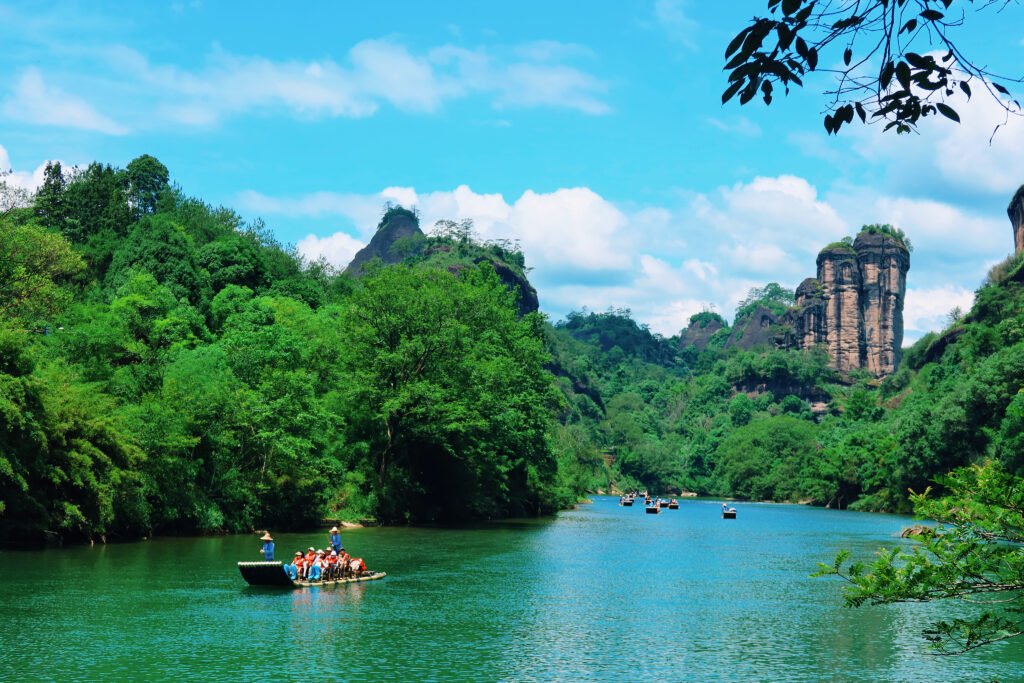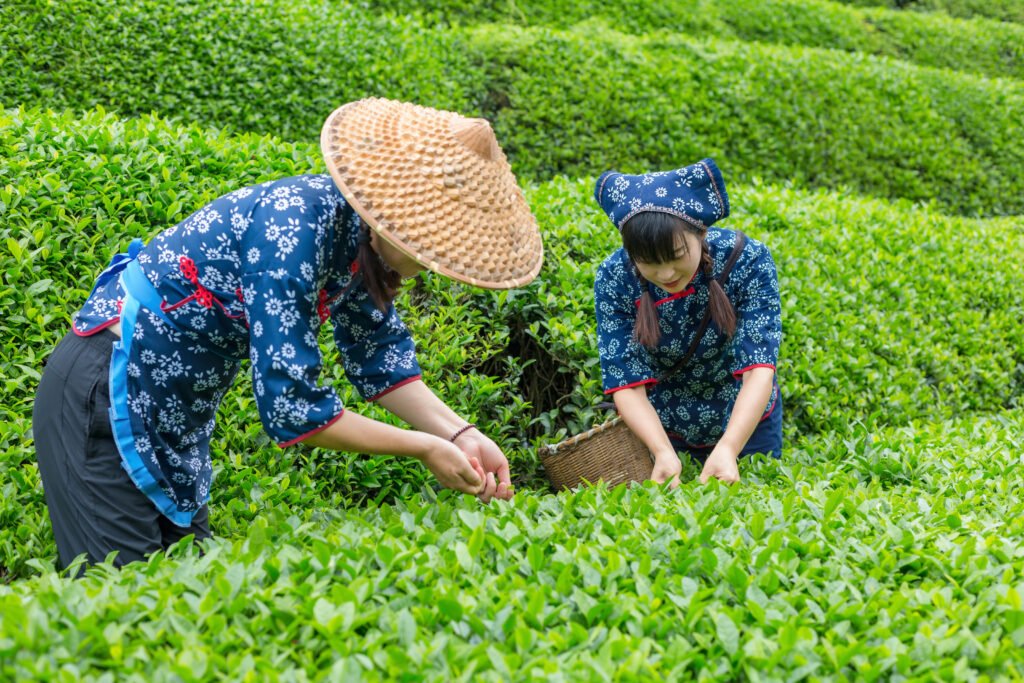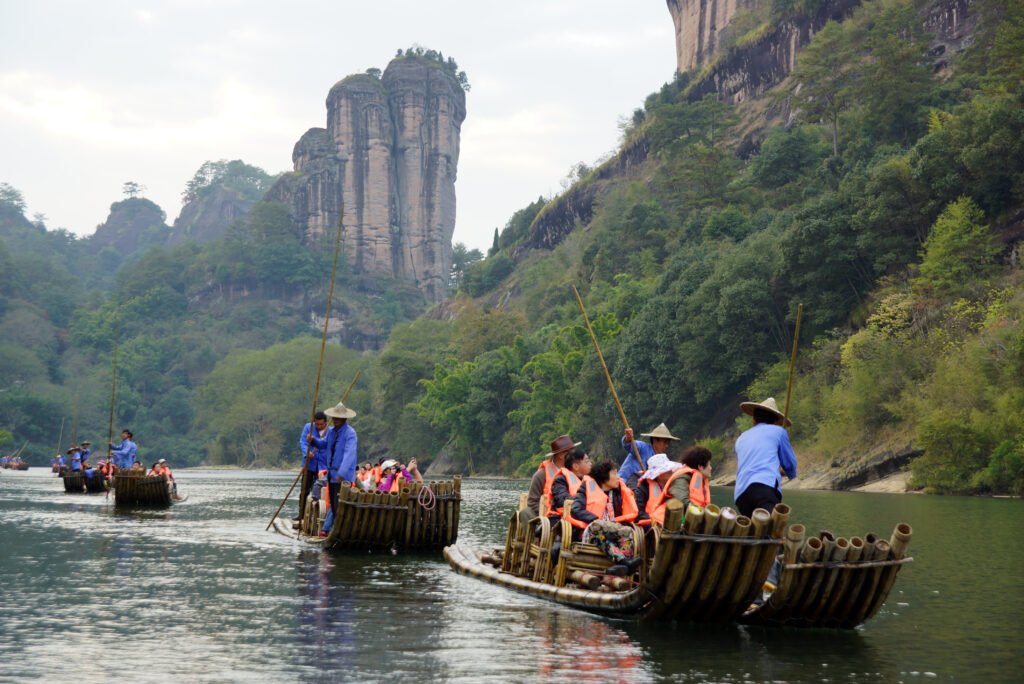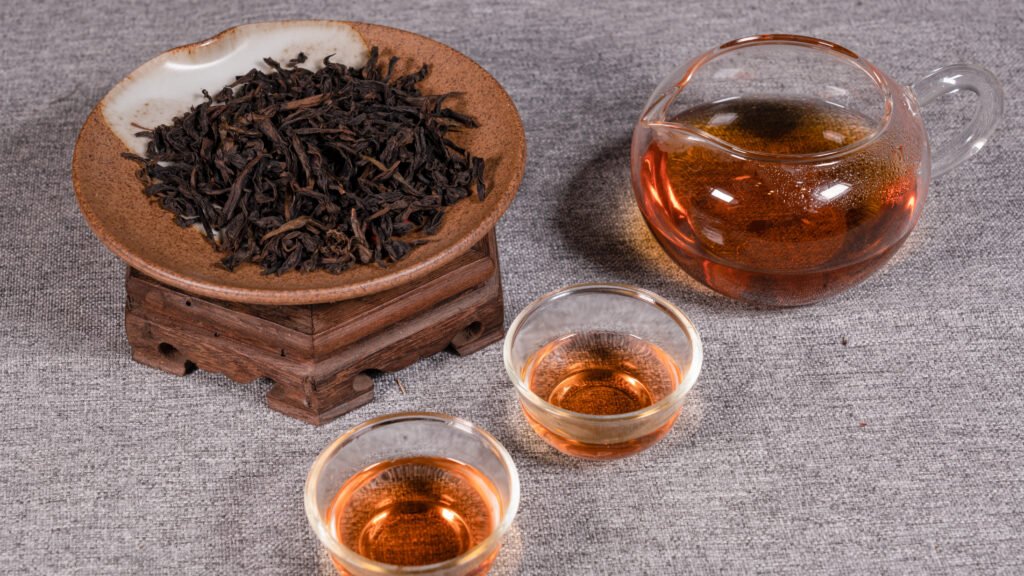Wuyi Mountain, located in northwestern Fujian Province, is recognized by UNESCO as a “World Cultural and Natural Dual Heritage Site.” It is renowned for its unique Danxia landform, profound cultural heritage, and abundant local products and cuisine. It is not only a paradise for nature lovers but also a must-visit destination for cultural explorers and food enthusiasts.
Culture and Tourism

Wuyi Mountain has long been celebrated as “the most beautiful Danxia landscape in southeast China, with emerald waters and crimson mountains.” Its distinctive Danxia landform features 36 majestic peaks and the meandering Nine-Bend Stream, creating a picturesque scene where the graceful “Jade Maiden Peak” stands opposite the towering “Great King Peak.” Visitors can drift downstream on bamboo rafts, admiring the reflection of the peaks in the water—a view often described as “a Buddhist kingdom in the water”—and experience the poetic sensation of “sailing on clear waves, moving through a painting.”

This area is the birthplace of Zhu Xi’s Neo-Confucianism. The renowned Southern Song Dynasty philosopher Zhu Xi taught here for fifty years. The Ziyang Academy, with its black tiles and white walls hidden behind sweetgum trees, embodies the profound Confucian cultural heritage. The autumn sunlight filtering through the carved window lattices creates a serene and solemn academic atmosphere. Additionally, the cliff burial customs left by the ancient Yue people add a mysterious charm to Wuyi Mountain.
Our partner is a tea master from Wuyi Mountain who will offer an in-depth experience of the intangible cultural heritage tea-making techniques. The craftsmanship of Wuyi Rock Tea (Da Hong Pao) is among China’s first national intangible cultural heritage items. Under the guidance of National First-Class Tea Master Peng, visitors can deeply experience the entire process of this exquisite craft:

1. Picking: During early morning when the dew has just dried, venture into the Zhengyan tea garden to learn the “open-leaf picking” standard and identify high-quality tea leaves with one bud and three leaves.
2. Withering: Spread the tea leaves evenly on bamboo sieves for withering under sunlight or indoor heating. Observe the leaves transition from fresh and crisp to wilted in a “reviving” state, releasing a grassy aroma.
3. Qing-making: This is the key to forming the “green leaf with red edges” characteristic of rock tea. Through alternating shaking and resting, observe the fermentation process at the leaf edges and the color change from green to red, while the room fills with the complex aromas of orchid and fruit.
4. Fixation: Employ traditional methods like mass frying, stir-frying, and hanging frying in a high-temperature wok to deactivate enzymes rapidly, locking in the aroma. This step tests the tea master’s precise control of heat.
5. Rolling: While the leaves are still hot, knead and press them to curl into strip shapes, squeezing out tea juices to coat the surface, laying the foundation for flavor and aroma.
6. Initial drying: Promptly bake the rolled leaves, evaporate moisture, and facilitate storage and subsequent refining.
Recommended cultural experiences include:
· Watching the sunrise and sea of clouds from Baiyun Temple: Climb the mountain at dawn to witness the spectacular scene of rolling clouds and Danxia peaks dyed golden-red by the morning light.

· Bamboo rafting on the Nine-Bend Stream: Enjoy the Danxia peaks along the way, listen to the rafters’ tales of ancient Yue legends, and experience the wonder of “mountains winding around water, water threading through mountains.”
· Visiting Ziyang Academy: Reflect on the breadth and depth of Neo-Confucian culture at the site where Zhu Xi once taught.
Culinary Delights
Wuyi Mountain’s cuisine benefits from its rich natural resources and unique cultural background, offering distinct flavors that combine mountain freshness with spicy and salty notes (influenced by Jiangxi culinary culture).

· Tea banquets and snacks: As the “Kingdom of Tea,” Wuyi Mountain is famous for producing rock teas like Da Hong Pao. Locals skillfully incorporate tea into their diet, creating unique tea banquets (e.g., dishes cooked with tea), Da Hong Pao tea eggs, milk tea, and ice cream. Zhu Xi’s Filial Piety Cake, filled with chestnuts and lotus seeds, offers a light fragrance and symbolizes the virtue of filial piety.
· Intangible cultural heritage smoked goose: Langgu Smoked Goose is one of Wuyi Mountain’s most representative dishes, with its preparation technique listed as a Fujian Provincial Intangible Cultural Heritage. Golden in color and rich in smoky aroma, infused with osmanthus leaves and tea fragrance, it provides a spicy and addictive taste, embodying the local saying, “no feast is complete without goose.”
· Wengong cuisine: Created in honor of Zhu Xi, also known as “Assorted Round.” Made with layers of lean pork, eggs, and refined flour, topped with red dates or mushrooms, it symbolizes “rapid promotion” and offers a rich, savory taste.

· Mountain flavors: Abundant in mushroom resources, Wuyi Mountain’s deep-fried tea tree mushrooms are crispy and uniquely flavorful. Additionally, there are Shunchang stuffed eggs symbolizing reunion, fragrant black rice, and refreshing Ficus pumila jelly among other local snacks.
Wuyi Mountain is a treasure trove where natural wonders, cultural heritage, and authentic flavors perfectly merge. Whether marveling at the grandeur of Danxia clouds and seas, exploring the depths of Zhu Xi’s philosophy, hands-on experiencing the intangible cultural heritage behind a cup of fine tea, or savoring the unique tastes of rock tea and local cuisine, it offers a multi-layered, immersive cultural travel experience. It truly deserves its reputation as “one of the top ten places in the world with the highest happiness index.”